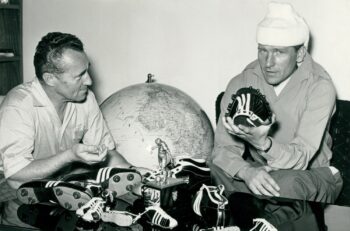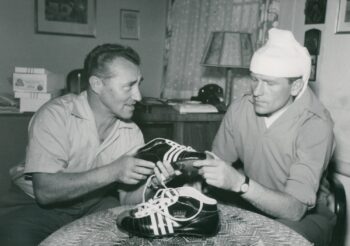
29. JULY 2021 BERND TRAUTMANN - THE HERO OF MANCHESTER
Now it was time to get down to business. Adi showed Bernd "Bert" Trautmann the latest developments from adidas; he talked about his plans and visions. The achievement of the screw-in cleats was far complete, further ideas and developments were already swirling in Adi's mind.
Trautmann, tormented by a bad permanent headache, was impressed and was able to forget about his pain for an afternoon. He let himself be carried away into the world of Adi Dassler.
In the early evening, he told Adi the story of how he had come to the permanent headache and bandage on his head. "We were playing Manchester in the final of the English championship at Wembley Stadium with 100,000 spectators. They had control of the ball and were attacking; there were just 15 minutes left on the clock. When the striker came within reach, I threw myself on the ball; that's when Peter Murphy struck my head."
The rest of the story became world news. Trautmann kept his composure and played the remainder of the game, another fifteen minutes after the collision. Manchester became champions after a 3-1 victory over Birmingham. But Trautmann could not cheer; his skull throbbed with pain. After this performance, the English no longer spoke of the "ugly Germans." They recognized Trautmann as the embodiment of an impeccable sportsman.
Bernhard Trautmann was born in Bremen-Walle in 1923. When VSK Gröpelingen (now Tura Bremen) founded a soccer department in 1931, eight-year-old Bernhard was one of its first players. No one suspected he would achieve world fame as a goalkeeper one day since he initially played as a midfielder and later striker.
His move to goalkeeper didn't change until after World War 2. The 17-year-old Bernhard volunteered to join the Luftwaffe as a paratrooper in 1941. He was sent to the Eastern Front as a radio operator. After three more years, he was assigned to the Western Front as a sergeant. He defected shortly before the end of the war. On his way back to his hometown of Bremen, he fell into British captivity and was sent to a prison camp in England.
In the prison camp, soccer was a regular pastime. Initially, Trautmann played in midfield until one fateful day; his team didn't have a goalkeeper. One of his fellow prisoners yelled, "Hey, tall guy, you'll be our goalkeeper!"
When his prison camp closed in 1949, Trautmann chose to stay in England. He played for the provincial club St. Helens Town near Liverpool as a goalkeeper. His saves caused such a stir that he soon attracted the attention of clubs in the First Division.
Trautmann signing up to play for Manchester City was anything but a thoughtful decision. One day, the Manchester City officials just showed up at his door while he was in bed with the flu. He desperately wanted to get rid of them and return to resting, so he signed the contract on the spot.
As Manchester City goalkeeper, Trautmann initially faced harassment because of his military past. "Traut the Kraut" was still the friendlier insult from the stands. But the German goalkeeper won over fans with his decent behavior and incredible performances on the pitch. He made a name for himself by rushing out of the goal and unreservedly throwing himself on the ball.
This willingness to hurl himself at the feet of Peter Murphy in the 1956 cup final led to his head injury, them winning the game, and Trautmann becoming the first foreigner to be voted Footballer of the Year.

During his visit to Herzogenaurach, he told Adi Dassler what it was like after the final: "I went back to Manchester with the team for the big reception. When my famous predecessor, Frank Swift, gave me an enthusiastic pat on the back, everything shifted, and the next thing I knew, I was lying on the floor. All it took was some wrong move, and that was it."
"Then what?" asked Adi, at the edge of his seat.
"The team went on tour in Germany, and I went to the osteopath that Monday. We call the guy in Manchester bone crusher or bonesetter. Supposedly he also treats the royal family. My head was leaning to the right, so the doc said; five vertebrae had dislocated, and he wanted to put them back in and straighten me out. But he had difficulties with the fifth vertebra, so he brought me to his private clinic. That's when they discovered that my second vertebra had cracked diagonally."
To set the vertebra and allow them to heal, they drilled four holes in the top of his skull and inserted a U-hook. Having to stay perfectly still, he explains, "I could only lay on wooded boards and had to be fed artificially. Reading the newspaper was only possible with special telescoping glasses."
"Respect! Respect!" said Adi. Now here was an athlete after his own heart.
In 2018, after nine years of work, the German director Marcus Rosenmüller released the film "Trautmann." It can also be seen in the ARD media library, accompanied by an impressive documentary (see links below).
